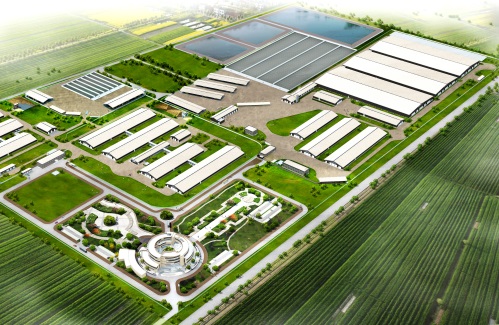GEA Group has in November 2014 joined Nestlé’s newly inaugurated Dairy Farming Institute (DFI) in Shuangcheng in Northeast China (Heilongjiang Province) as designated partner for milking and hygiene.
The institute aims to help advance dairy farming practices and sustainably ensuring quality domestic milk supplies to meet the growing consumption of milk products.
Ivan Breyne, president of GEA (Shanghai) Farm Technologies Co., Ltd tells Food News International how will the institute and its partnership help boost China’s dairy industry in the future.
Here are more details.
FNI: How did this partnership with Nestle happen?
Breyne: The key reason is that GEA’s Total Solutions concept and its products are competitive for the Chinese market and internationally integrative as well.
Furthermore it was the common understanding of a cooperation that really made GEA fit into the DFI concept.
The partnership is also a result of a close cooperation and a good working relationship of the local Nestle Management and the local GEA Farm Technologies team.
FNI: What outcomes would you expect out of this partnership?
Breyne: With the DFI we have the great opportunity to make the saying “give a person one fish they can eat today, but if you teach that person to fish for themselves they can eat for their lifetime” a reality for dairy farmers in China.
The goal is to teach local dairy farmers how to successfully run a dairy farm – what does it take to expand their herd and milk cows in a more commercial way.
Furthermore, they will be trained in the areas of breeding, feeding and nutrition, calf rearing/young stock care and milk harvesting.
In a nutshell, they will learn what modern and efficient dairy farming and milking facilities look like.
FNI: What were the challenges that GEA has to overcome in this partnership, especially pertaining to the work ahead?
Breyne: Bringing the DFI to life is the result of many hours of hard work from a lot of individuals across the globe.
The challenges ahead are to work together with many organizations to get the training modules complete and the local trainers up-to-speed.
Each partner of the DFI has committed personnel and financial resources to make that a reality.
We have identified the key experts necessary to lead the training modules that we are responsible for and those individuals are excited to share what they know with the students in the near future.
FNI: How will this transfer of knowledge and technology help bring back consumers’ confidence in milk products in China?
Breyne: The consumer will benefit in the results of the DFI as the farmers that are trained take the skills they have learned back to their farms.
The keys to consumer confidence are: Standard operating procedures, modern methods of animal care, nutrition to provide better cow milk yields, and most importantly the ability with the learned procedures and processes to better analyze and trace back issues of concern.
FNI: In your view, what is the impact to China’s diary industry since past quality-related incidents in the dairy industry? What were the wins manufacturers have enjoyed since then?
Breyne: The most important impact is that consolidation of the dairy farms is happening at a fast pace.
As farms consolidate and increase in size, there is also an increase in the professionalism in managing larger farms.
The DFI will help to further that professionalism at the local farmer level.
Manufacturers win as farmers upgrade their processes and facilities to gain a consistent high quality level of raw milk the food processors.











